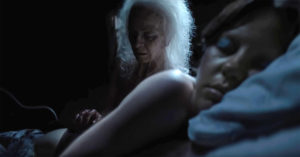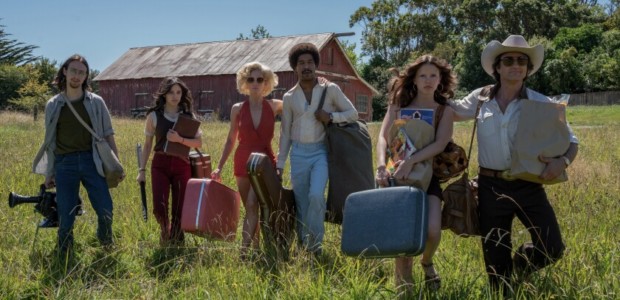X, the newest horror throwback from writer-director Ti West, is a thesis on the changing tide of American culture and a surprisingly emotional look at the dangers of repressed desire. It is bloody and brutal, horny and hilarious; it is a wide-ranging treatise on the state of American cinema and where we are in the cultural pendulum swing between conservative and progressive. Most of all, X is a bold horror film that might just be the best dirty movie you’ve seen all year.
Wayne (Martin Henderson) wants to make the best damn porn movie he can. He loads up his crew — Wayne’s girlfriend Maxine (Mia Goth), her co-stars Bobby-Lynne (Brittany Snow) and Jackson (Scott Mescudi, AKA Kid Cudi), their director RJ (Owen Campbell), and RJ’s girlfriend Lorraine (Jenna Ortega) — and travels from Houston to a remote cabin where they can have all the privacy (and tax breaks) they need to shoot the next Debbie Does Dallas. The owner of the cabin, Howard (Stephen Ure), is an elderly man who’s quick to threaten Wayne with a shotgun until he remembers who he is; then he tells the group to keep quiet and stay out of his wife’s sight and everything will be okay. However, the first thing the viewer sees in the film is the aftermath of a bloody massacre at the cabin, and the majority of the film is a flashback that reveals exactly what happened and why.
The whole cast shines, and I would be remiss if I didn’t call attention to Kid Cudi’s strong performance as the laid back, professional Jackson, but the true stars here are Brittany Snow and Mia Goth. Snow gets some of the funniest lines, including a delightful “I’ll have what she’s having” moment, as well as some of the most affecting scenes. (In the name of journalistic integrity, I must admit that her musical interlude had me misty-eyed in the theatre.) Goth carries the heaviest acting burden, though, and she pulls it off with aplomb. Between X and Suspiria, Goth’s use of her body to tell a story is a marvel, as is her ability to shapeshift in service of finding the horror and pathos in a character.
X is self-aware, but not in a wink-wink, nudge-nudge, post-SCREAM fashion. Rather, X wears its influences on its sleeve and uses its affinity for the punk ethos of ‘70s independent cinema as a call to arms for horror cinema today. There are clear references to the early films of Tobe Hooper and plenty of tongue-in-cheek humor. X is a movie that has fun with sex and doesn’t see it as something shameful; occasional Ti West stand-in RJ even says, “It is possible to make a good dirty movie!” as his reasoning for filming The Farmer’s Daughters, X’s movie-within-a-movie. In one of the film’s most self-aware moments, RJ talks about the “avant-garde” editing he wants to use, and then Ti West and co-editor David Kashevaroff adopt an experimental editing style that adds to X’s scares and its ruminations on the passage of time in a cleverly elliptical montage style.

Some critics seem to read this film as a treatise on the horrors of aging, but I see it as a film about the horrors of repressed desire. X argues that age is no reason not to go after the things that you want, using an affecting performance of “Landslide” and a climactic sex scene to underscore how common sexual desire is and how natural it is to indulge in it (with the usual caveats, of course, that the sex be consensual and take place between adults — X argues that there is no upper limit on the age range for being sexually active). It’s when Howard and his wife deny themselves sexual outlets that the trouble starts; they’re not jealous of what they can no longer have, they’re jealous of the things they think they’re too old to have. That distinction — self-denial based on the spurious view that there is an expiration date on living a fulfilled life — makes all the difference.
That self-denial marks the encroachment of the ‘80s and all the shrieking moralizing that it entails; namely, the Reagan years and the rise of the Moral Majority. X takes place in 1979, after all, the same year that Jerry Falwell founded the Moral Majority and the year before Reagan was elected president. The ‘70s were the golden age of independent cinema and, as X posits, the last gasp of artistic and sexual exploration before the conservative movement pushed them both behind the beaded curtain of America’s cultural video store. This film is a celebration of cultural freedom and a warning of what was to come: people whose self-denial is so pathological that they wish to impose it on others. That’s where the real danger lies, X argues: in a country that represses its urge to create and its urge to fuck.
Despite the storm on its horizon, X feels hopeful. Ti West is calling back to the glory days of independent cinema for a reason: so we’ll see more of these films on our screens and reclaim (or perhaps even surpass) the boldness, creativity, and punk DIY attitude of ‘70s cinema. Couple that with the film’s reminder that you’re never too old for sexual or creative fulfillment, and this bloody, horny, cheeky slasher becomes ironically life-affirming. We’re still here, X tells us. So do something about it.


No Comments